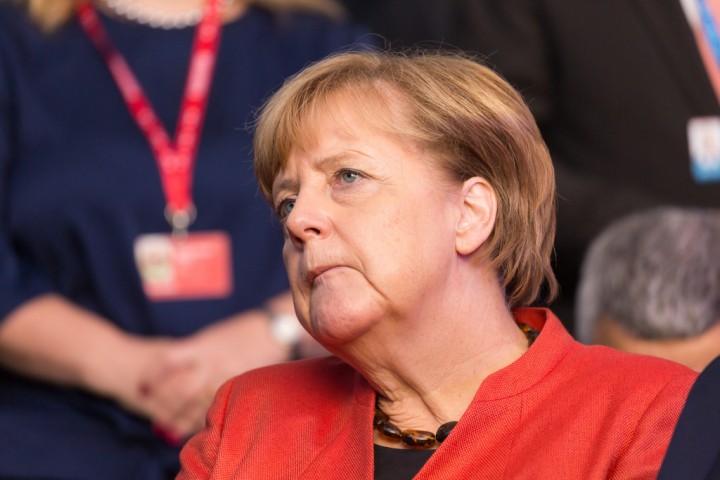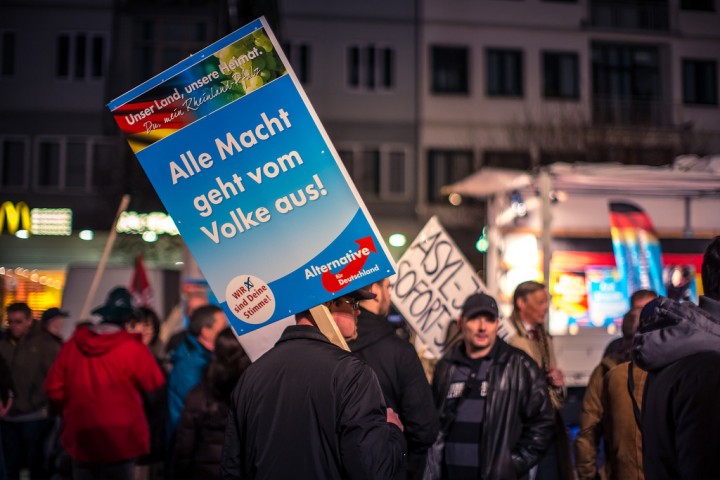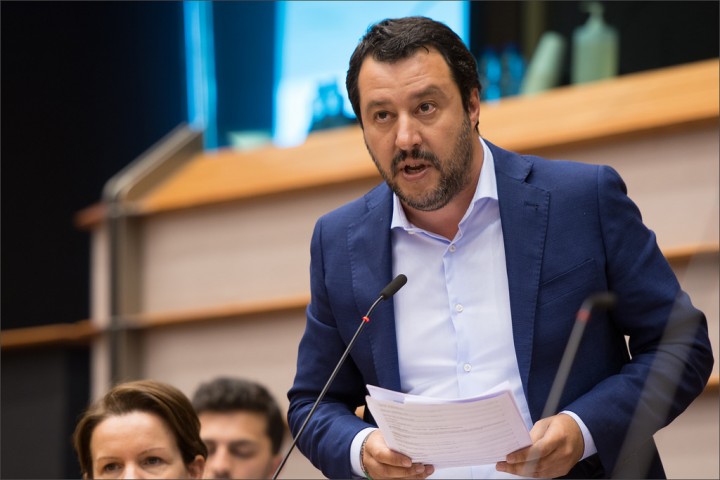It wasn’t long ago that Germany was considered one of the few countries with a stable political situation. On the surface at least, with high economic growth and a dominant position within Europe, everything seemed to be going well for the German ruling class. However, this stability is turning into its opposite.
For over 70 years, the Christian Democratic Union (CDU) and the Christian Social Union (CSU) have formed a bloc, with the CSU standing for elections in Bavaria and the CDU standing elsewhere. For the most part, this alliance has been fruitful for both parties. That is, until a spat over immigration threatened to break them apart.
The spark that inflamed the conflict was struck when Horst Seehofer, the Minister of the Interior and leader of the CSU, was due to present a plan to toughen up Germany’s approach to asylum seekers. The minister wanted to give police the power to turn refugees away at the border if they were already registered in another EU country. Angela Merkel, however, rejected this proposal, thus angering her sister party.
Openly challenging Merkel, Seehofer threatened to implement the policy anyway, which is technically within his ministerial power. Merkel hit back to say that his plans wouldn’t “automatically” come into force, which could have been a subtle warning that she would sack him. This very risky move could have provoked the CSU to withdraw support for the CDU, thus removing the Grand Coalition’s majority and thus precipitating new elections. Luckily, from the perspective of the German ruling class, this rather drastic outcome was avoided when the CSU gave Merkel until the EU Summit of the 28/29 June to agree on a number of bilateral deals to find a solution.
Why a split now?
Given that, according to the Financial Times, migrant inflows are down 90 percent compared to 2015, the fact that this crisis has occurred now might seem strange. However, the real reason this dispute broke out has more to do with the CSU’s panic over the rise of Alternative for Germany (AfD). At the federal election in 2017, the CSU’s vote fell by 10.5 percent to 38 percent, whilst the AfD received 12.4 percent in Bavaria. With regional elections taking place in October, the leaders of the CSU are increasingly worried. The party has governed the region with an absolute majority since 1962, except for the state election in 2008, when a result of 43.4 percent meant they had to form a coalition government with the FDP for five years. Losing the majority in Bavaria would, therefore, be a huge defeat for the CSU.
Germany is the strongest economy in the EU, with unemployment at 3.4 percent – the third lowest overall. Additionally, the austerity carried out since 2008 was a lot less severe than in many countries around the world. In which case, why are we now seeing a rejection of the main parties in the country?

The fact is that the German working class went through its round of austerity well before the financial crisis. In an attempt to restore ‘competitiveness’, the Social Democratic Party (SPD) government under Gerhard Schröder carried out a policy of ‘wage restraint’ during the period 1998 to 2005. This policy, known as ‘Agenda 2010’, involved massive tax cuts for the rich alongside cuts to pensions and unemployment benefits. By 2008, the share of national income taken up by wages had been cut to 64.5 percent: the lowest level for 50 years. Moreover, inequality now stands at its highest level since 1913. What this means is that German capitalism pushed the price of labour power down massively, thus making the price of German goods much more competitive on a global scale. Additionally, the fact that the purchasing power of working-class people was pushed so low (40 percent of the population have less purchasing power today than 20 years ago) also meant that imports were reduced. This meant that Germany went from being the ‘sick man of Europe’ to a strong economy based on low wages and high exports.
This also meant that, below the surface, there were growing feelings of anger and resentment at the status quo. Like many other countries around the world, this anger has led to the collapse of the so-called centre ground. The federal election saw the CDU/CSU and the SPD get their worst results since the 1940s and, since the formation of the ‘Grand Coalition’, this has fallen even further: support for all three parties combined is now below 50 percent.
Polarisation undermines traditional parties
There has been a polarisation in German politics, which has expressed itself on the right with hostility towards Angela Merkel. This was only exacerbated by her decision to form a coalition with the SPD, which left many in the CDU feeling “betrayed and sold out” according to the senior CDU MP quoted in the Financial Times. On the left, the betrayals of the SPD have massively reduced its appeal, whilst Die Linke has been tarnished somewhat by its record when it has been in power.
This has produced a political vacuum in Germany, which has been filled in part by AfD. Whilst the CDU/CSU bloc is the traditional party of big business, AfD has built up some support among petty-bourgeois layers by advocating a number of protectionist policies such as opposing TTIP. Moreover, given the failures of the SPD and Die Linke to offer a radical alternative thus far, AfD has also managed to attract some workers in a demagogic fashion, with support for the minimum wage and for the reduction of taxes on families with children. Additionally, if there is no mass organisation explaining that standards of living are being squeezed, not because of mass immigration, but because of the capitalist system, then it is hardly a surprise that some people are tricked into thinking all their problems can be solved with tighter borders.
 The political vacuum in Germany has been filled in part by AfD / Image: Stephan Dinges
The political vacuum in Germany has been filled in part by AfD / Image: Stephan Dinges
Whilst AfD has been winning votes with a Eurosceptic, protectionist stance, this approach is not in the interests of German capitalism, which is hugely reliant on the European Union. German capitalism has become an export-oriented economy where 30 percent of jobs are related to exports and 65 percent of these exports are within the EU. With the potential introduction of tariffs, which will harm exports to the US and possibly increase competition from Chinese goods dumped on the market, the EU, which allows Germany to act within a political bloc to compete on a world scale, is likely to be even more important to German capitalism in the coming period.
It is no surprise, therefore, that Merkel rejected Seehofer’s proposal as being against a “pan-European solution.” The only option for Merkel – who is desperate to keep the European Union together – was to seek bilateral agreements with individual nations at the EU summit. Luckily for her, Alexis Tsipras seemed to come to the rescue on 28 June, telling the Financial Times that Greece was ready to help. However, this offer may well come with some strings attached, such as debt relief for the heavily-indebted Greek state. This would cause political problems of its own given the nasty rhetoric about ‘lazy Greeks’ from some on the right. In any case, Greece only allows between 50 and 100 migrants per month to cross its northern border, which would not affect the total numbers greatly; after all, Germany has taken in 1.4m migrants since 2015 alone.
The Italian problem
Merkel needed “above all to reach an agreement with the Italians”, as one CDU MP put it. Italy, due to its position in Europe, has a large number of migrants arriving on its shores. If we take Seehofer at face value, therefore, he is effectively demanding German police be given the right to send large numbers of migrants and asylum seekers back to Italy. The trouble with this, however, is that Italy’s Five Star-League coalition government made reducing immigration one of its tentpole policies. Indeed, Matteo Salvini, the leader of the League and Minister of the Interior, threatened to “renegotiate Italian financing to the EU” if they were unable to reduce the number of migrants Italy was taking. Giuseppe Conte has also demanded a “radical change” in the so-called Dublin principle, which stipulates that the country in which an asylum seeker first arrives is responsible for dealing with that individual. From the point of view of the Italian government, it is unfair that they have to bear the burden for the entire European Union due to a curse of geography. This means that, at present, there is a seemingly intractable conflict between their wishes.
It could well be the case that, in a desperate attempt to keep the European Union together, Merkel offers the Italian government an exemption from EU budget rules so that the government could try to carry out some of the reforms promised in the two parties’ manifestos. Nevertheless, this option would cause huge instability in the European Union given the already massive debts of the Italian state. Moreover, even this option may not work. One EU diplomat was quoted as wondering whether there would be a “cheque big enough” to change Salvini’s mind.
 An EU diplomat was quoted as wondering whether there would be a “cheque big enough” to change Salvini’s mind on immigration / Image: EP
An EU diplomat was quoted as wondering whether there would be a “cheque big enough” to change Salvini’s mind on immigration / Image: EP
The lack of options open to Merkel was clearly revealed in the EU Summit on 28 June. The European leaders present agreed to create camps to house migrants and asylum seekers until a decision is made on whether they can stay in Europe. There would be some camps in northern Africa and some in EU countries that “voluntarily” sign up. Where an agreement was less forthcoming, however, was on the question as to who would take these migrants. A proposal to share out the number, which would have been favoured by Italy, was flatly rejected by a group of countries led by Hungary. Ultimately, they decided that shows of “solidarity”, i.e. housing asylum seekers, would be “voluntary”. Clearly, this solves precisely nothing. Before the ‘agreement’, the problem was that some states were reluctant to take more migrants and the ‘burden’ weighed too heavily on the so-called frontline countries. This will remain a problem now.
Back from the brink – for now
Given the lack of options, it seemed very likely that the CDU/CSU partnership would end. However, despite the increasing tension between the two camps, the alliance has been incredibly fruitful for both parties. It has allowed the CSU to win ministerial positions in government, and the CDU to rely on seats won in Bavaria to bolster its national electoral performance. Moreover, if the agreement was to break down, the CDU could decide to stand in Bavaria and the CSU in the rest of Germany. This would split both parties’ votes and could weaken them in relation to the AfD; and, after all, the conflict was caused in the first place by a fear of losing power. It is these considerations that explain why Seehofer called a split “unrealistic” and one CSU MP talked about the “community of fate” between the two parties.
Despite the seeming concessions on Seehofer’s part, there was a clear split within the CSU over whether to accept the deal Merkel had struck. On the one hand, the pro-European wing seemed happy, with the vice-chairman of CSU-Landesgruppe, Hans Michelbach, describing the deal as a “positive signal that something is moving in Europe in the right direction.” On the other hand, Seehofer rejected the deal as “inadequate” and “not effective.” Unfortunately for Seehofer, however, as the Financial Times reported, he did not have the support of his executive, and so offered his resignation.
 Seehofer and Merkel have come to arrangement that in reality solves nothing / Image: Michael Lucan
Seehofer and Merkel have come to arrangement that in reality solves nothing / Image: Michael Lucan
Nevertheless, Seehofer and Merkel decided to have one final meeting on Monday 2 July, at which, finally, Seehofer announced that the two had “reached an agreement after very intense negotiations.” This agreement amounts to the setting up of transit centres on the German border with Austria where refugees can be sent back to countries where they first arrived, rather than being turned away at the border. Merkel pointed out that they will “conclude administrative agreements with the countries concerned” and that this reflects the “true European spirit.”
Still, Seehofer and other CSU figures have made bold promises to deal with the amount of immigration. In Bavaria, there is growing discontent among the urban and rural masses over the quality of life. Issues such as the lack of affordable housing are driving this discontent. The CSU is unable to offer solutions to these problems. Indeed, the prime minister in Bavaria, Markus Söder, was responsible for privatising public housing companies as Finance Minister for many years. They have therefore turned to whipping-up anti-immigrant sentiment in order to distract people. In the absence of a left-wing alternative, any backtracking from the CSU is therefore likely to be punished with a further move towards the AfD.
Crisis unresolved
It is also unclear whether Merkel will be able to convince the SPD to agree to what are effectively prison camps for refugees. This deal strays quite far from the original coalition agreement signed just over 100 days ago and represents a shift to the right by the government. Nevertheless, the SPD leadership, who have never been famed for their capacity to adopt a principled stance, will be terrified of forcing through new elections, and so could meekly accept the proposals.
It is also not clear how Merkel will be able to convince governments to take back migrants that had originally been registered in other countries. It will matter little to the Italian government whether migrants are sent back to Italy straight from the border or, in a ‘nice’, ‘European’ way – after a short stay in a de-facto prison camp.
Regardless of whether this particular conflict is resolved, what it reflects is the fact that in Germany, just like many other countries around the world, the ruling class is becoming less and less able to rule in the old way. Lenin once said that splits at the top are a necessary condition for the existence of a revolutionary situation. Germany, it seems, has joined the long list of other countries where the cracks are beginning to show.

